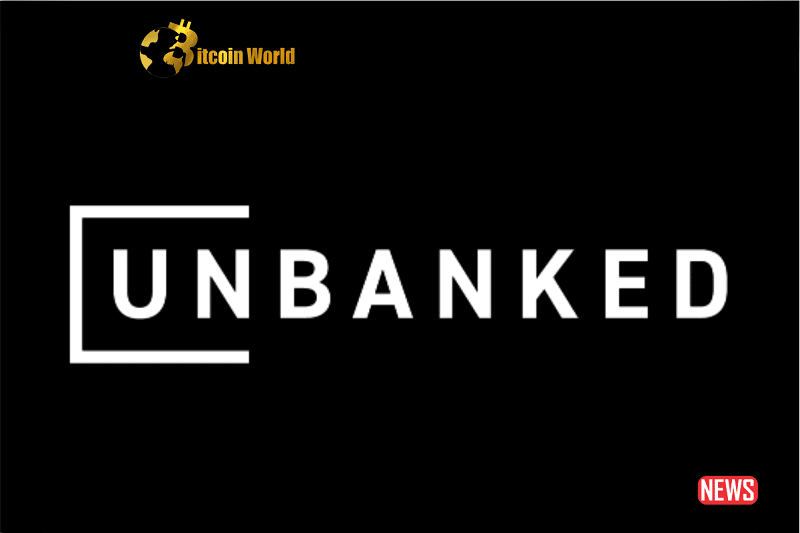The cryptocurrency landscape in the United States just got a little less crowded. Unbanked, a promising crypto fintech firm focused on providing crypto custody and payment solutions, has announced its closure. The reason? A regulatory environment in the US that they describe as stifling. It begs the question: is America becoming too hostile for crypto innovation?
Unbanked’s Story: A Five-Year Struggle
Cofounders Ian Kane and Daniel Gouldman didn’t enter the crypto space naive. Back in 2019, they believed building their company within the US, despite its regulatory hurdles, would be the strategic long-term move. They envisioned a future where playing by the rules would ultimately pay off. Five years later, that vision hasn’t materialized.
In a candid blog post on May 26th, Kane and Gouldman revealed their disappointment. While other crypto ventures thrived offshore by sidestepping stringent regulations, Unbanked chose a different path. They opted to engage with regulators, navigating what they now describe as “arduous processes.” This commitment, they explain, led to significant setbacks:
- Wasted Time: Navigating complex regulatory frameworks consumed valuable time that could have been spent on development and growth.
- Excessive Costs: Compliance efforts and legal fees mounted, placing a significant financial burden on the company.
Their conclusion is stark: “US regulators are actively attempting to prevent companies (banks and fintech) from supporting crypto assets – even when the companies are attempting to do so correctly and in accordance with the law.” This sentiment echoes the concerns of many in the crypto industry.
The Funding That Never Arrived
Adding insult to injury, Unbanked was anticipating a crucial $5 million investment that ultimately fell through. According to the cofounders, the uncertain regulatory landscape in the US directly impacted their ability to secure this funding, hindering their capacity to maintain a sustainable business.
Imagine being on the cusp of expansion, having even secured a partnership with a payments giant like Mastercard, only to have the rug pulled out from under you due to external factors. This is the reality Unbanked faced.
They had even signed a term sheet for the $5 million investment at a $20 million valuation just weeks before announcing the closure. The funds, however, never arrived. Now, Unbanked is urging its customers to withdraw their funds as quickly as possible.
Unbanked Isn’t Alone: A Growing Trend?
Sadly, Unbanked’s situation isn’t an isolated incident. A wave of closures is hitting the crypto space, raising concerns about the future of innovation in the US. Consider these recent examples:
- BottlePay: This Bitcoin Lightning Network payments firm shut down on May 23rd, with all services ceasing by June 24th. They didn’t explicitly state the reason, leaving room for speculation.
- HotBit: Just a day before BottlePay’s announcement, this cryptocurrency exchange declared its closure, advising users to withdraw their funds. While citing the FTX collapse and USDC depeg as contributing factors, HotBit pointed to an investigation involving a former team member as the primary cause. This investigation had previously forced them to suspend operations for several weeks.
- Teressa: This fractional-ownership NFT platform closed its doors on May 12th, citing unsustainable company structure and financial difficulties. Cofounder Andy Chorlian described the decision as “incredibly difficult.”
What Does This Mean for the Future of Crypto in the US?
The closure of Unbanked and other crypto companies raises critical questions about the US’s approach to regulating this burgeoning industry. Is the current regulatory environment fostering innovation or stifling it?
Challenges Faced by Crypto Firms in the US:
- Lack of Clarity: The regulatory landscape for crypto in the US remains unclear and fragmented, making it difficult for businesses to operate with confidence.
- Stringent Requirements: Compliance costs and the complexity of navigating regulations can be prohibitive, especially for smaller startups.
- Limited Access to Banking: Many traditional financial institutions are hesitant to work with crypto companies, hindering their access to essential banking services.
- Enforcement Actions: Increased regulatory scrutiny and enforcement actions create uncertainty and risk for crypto businesses.
Potential Consequences:
- Innovation Moving Offshore: Strict regulations could push innovative crypto projects and talent to more welcoming jurisdictions.
- Reduced Competition: The high cost of compliance may create barriers to entry, limiting competition and potentially hindering the growth of the industry.
- Slower Adoption: A restrictive regulatory environment could slow down the mainstream adoption of cryptocurrencies and blockchain technology in the US.
Actionable Insights: What Can Be Done?
The situation isn’t hopeless. There are steps that can be taken to foster a more innovation-friendly environment for crypto in the US:
- Clearer Regulatory Frameworks: Establishing clear and consistent rules will provide businesses with the certainty they need to operate and innovate.
- Balanced Approach: Regulations should aim to protect consumers and prevent illicit activities without unduly hindering innovation.
- Open Dialogue: Regulators and industry players need to engage in constructive dialogue to understand each other’s perspectives and find common ground.
- Support for Innovation: Creating regulatory sandboxes or other initiatives can allow promising crypto projects to develop and test their ideas in a controlled environment.
Conclusion: A Crossroads for US Crypto
The closure of Unbanked serves as a stark reminder of the challenges facing crypto companies in the United States. While the intent behind regulation is often to protect consumers and maintain financial stability, the current approach appears to be inadvertently pushing innovation elsewhere. The US stands at a crossroads. Will it adapt its regulatory framework to foster a thriving crypto ecosystem, or risk falling behind as other nations embrace this transformative technology? The future of crypto innovation in America may well depend on the choices made in the coming years.
Disclaimer: The information provided is not trading advice, Bitcoinworld.co.in holds no liability for any investments made based on the information provided on this page. We strongly recommend independent research and/or consultation with a qualified professional before making any investment decisions.




